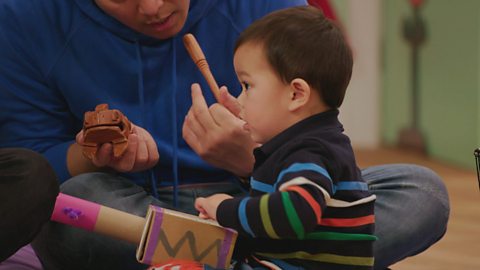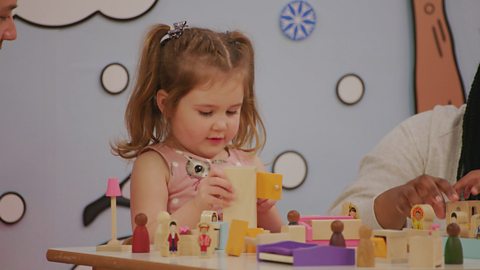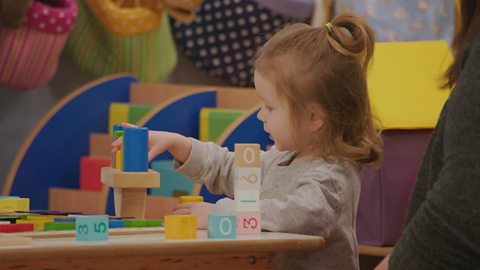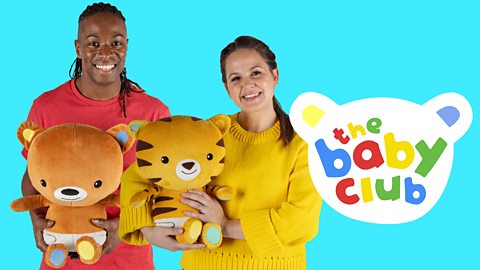Making music together is a fun way to expand your child's language through play.
You can use instruments that you have lying around your house, or create your own musical toys using household objects.
Take a step back and follow your childÔÇÖs lead. What instruments do they want to play with? What do they find interesting about different objects?
Watch the video below to find out how our families in The Toddler Club make the most of musical play.
(soft bells play)
Music, yeah, you just do your music.
(bells ringing)
Yellow bell, orange bell, red bell.
Can you see them? There are these bells!
(bells shaking)
They sound a bit different.
Whoa, what is that?
It's a tangoÔÇŽ - It's a tambourine.
And a rainbow.
They're like jingle bells. Yeah, they are rainbow.
Is it the frog?
Are you playing with the guitar? Are you playing with the guitar?
If you take this stickÔÇŽ Shall I show you? Here.
Hold this stick in this hand, and then we can can play it like this.
(guiro scrape sounds) (bells and shakers play)
Open. Open?
I don't think it does open. It's shut.
Shut. Shut.
(instruments banging and playing)
Mango, do you want me to have that stick?
[Dad] Do you want to try this one?
Do you want try this one? These two? Do you want to try?
That's it. Good girl, good boy.
Why is musical play so great for toddlers?
- Playing with music will teach your toddler how to take turns, which will naturally transfer into their talking.
- Your child will develop their attention and listening skills as they take turns playing an instrument with you.
- Breaking up words into syllables when playing an instrument is essential for speech development.
- Musical play can help children learn about opposites, such as loud and quiet, big and small and fast and slow.
- Exploring your pace and tempo in musical play helps your toddler understand that their talking can be fast and slow.

Top tips for musical play with toddlers
Developmentally, children love to play with music, as they get instant feedback and pleasure.
It doesnÔÇÖt have to be expensive. See what you have in your cupboards that you can safely make music with.
Here are some top tips for making the most out of your musical play:
1. Take turns
Turn taking through music will really help your toddler when they start to have full conversations.
Use language as you take turns playing an instrument to help your child understand the concept. You can say ÔÇťMummyÔÇÖs turnÔÇŁ, then ÔÇťOllie's turnÔÇŁ to support turn taking in conversation.
Your child will develop their attention and listening skills as they play with you like this. See if they can copy the amount of beats you play.
2. Build vocabulary
Your child can learn so many new words through musical play, not just ones for musical instruments.
You can chat to them about the colour of the instruments, the number of times you hit or shake it, and it's size.
3. Use music to help pronunciation
If your child is struggling to pronounce longer words, you can use instruments to break up these words into syllables. This will make them more manageable.
For example, if you child is going through a dinosaur phase, you can help them learn the names of dinosaur by using your instrument.
Say, ÔÇťSteg (tap) a (tap) sau (tap) rus (tap).ÔÇŁ This works with lots of long words too!

Using music in your child's daily routine
Music can be a great way to encourage your child to tolerate transitions between your daily routines.
For example, you can play The Toddler Club tidy up song at home to signal that it's time to tidy up. Or use the goodbye song when it's time to stop playing and try something new. Using the same song everyday supports routines and expectations in our toddlers.
Similarly, having a bedtime playlist that has the same first two songs helps toddlers identify that it is bedtime. Try it with your child, and you might see them start yawning when they hear their playlist.
Musical play around Tiny Happy People
Music is really beneficial for your child from the moment they're born. Check out some of the links below to find out more about the benefits of making music with your child:
- Have a look at this list of easy ways to get musical at home with young children.
- Fancy making your own homemade instruments? We have loads of options on this page.
- Why is music good for your baby's development?
Want more? You can watch the full series of The Toddler Club on 91╚╚▒Č iPlayer right now!






